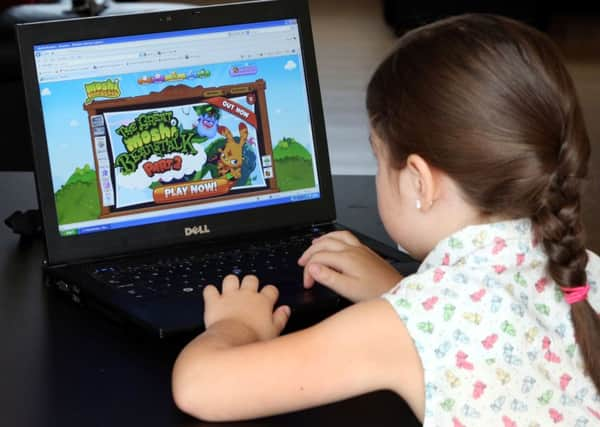Jayne Dowle: Screen-age kicks of a new generation who live online


However, the findings – by research agency Childwise – are being described as a “landmark change”. They come as part of an annual media monitoring report which has been following children’s viewing behaviour since the mid-1990s. The researchers talk regularly to a sample of more than 2,000 five to 16-year-olds, so I’d say it is pretty representative.
The average time spent online by this age group is now three hours per day, compared with 2.1 hours watching television. We’ll mention the really scary statistic for a moment, shall we? By my reckoning, this means that our sons and daughters are spending a total of more than five hours per day in total glued to a screen of some sort. Even my two, certainly no strangers to either internet or television, are not that addicted. I’d be worried if they were. In fact, I’d remove all the plugs in the house.
Advertisement
Hide AdAdvertisement
Hide AdHowever, just because I’m a parent, it doesn’t mean that I am going to throw my hands up in panic. Here’s the thing with “screen time”. There is the mindless activity of just sitting there letting what is flickering on the screen wash over you. Then there is “screen time” which might actually have some kind of useful purpose. It is important to differentiate between the two.
Also, what this research actually tells us is that our offspring are taking control by choosing online over traditional television. This is what should really interest us, not how many hours they spend doing it.
Into the “useful” category, I would certainly put doing research for homework. My daughter Lizzie visited the Bradford Industrial Museum with her primary school last week. Now she has to follow it up with an investigation into child labour in Victorian factories. I volunteered to help her, but she was ready and waiting for me with a BBC education resource video.
It brought the conditions of poverty and suffering to life, for sure. And I was delighted with her resourceful approach to finding it.
Advertisement
Hide AdAdvertisement
Hide AdHowever, I did add this caveat: when you’re doing research you can’t just copy what you see on the screen and think you’ve done the job. When I taught media at university, I would seethe with frustration at lazy students who thought they could find the answer to everything with a Google search.
Anyway, I digress. In fact, our children digress. All the time, but they might not realise they are doing it. There’s also a category I will call “curiosity”. Children and young people are desperate to discover things. The internet opens up a whole world of possibilities. It also opens up a whole world of danger, and that’s where parents have to become police officers.
Let’s think positive, though. Almost half of all five to 16-year-olds watch YouTube every day. They particularly want to see “funny” content – and yes, I’d like to thank my son for sharing with me the singing dogs and demented cats – and listen to music. However, about a third also use it to watch “how-to” videos to teach themselves anything from bettering their computer game skills to hairdressing techniques.
It’s also a popular way of viewing television programmes, used by 74 per cent of young people. You’d be surprised at some of the things they find on there. I caught Lizzie watching ancient episodes of Fawlty Towers the other day.
Advertisement
Hide AdAdvertisement
Hide AdI sincerely hope that this research really is remembered as a “landmark” event. It should give us all something to stop and think about. Essentially, it is about the online behaviour of children and young people. However, we can’t take their habits in isolation. I hear far too many adults pontificating about children spending too much time online without even considering their own behaviour. It’s hypocritical and if the children/technology issue bothers you that much, it also sets a bad example.
The next time you put your head in your hands and deplore the youth of today, ask yourself this: how long can you go without looking at your mobile phone? When was the last time you sat down at the allotted time for a whole week and watched your favourite soap opera when it was actually on television, rather than on catch-up? Do you use Amazon? eBay? Order groceries online, or check out your holiday destination on Trip Advisor, maybe even adding a few reviews of your own? If you do any or all of things, you have no right to take the moral high ground. You can’t go around running your life from your fancy tablet and expect them to sit quietly with their noses in an Enid Blyton book.
Let’s accept and embrace this brave new online world rather than pretend that it is not happening.